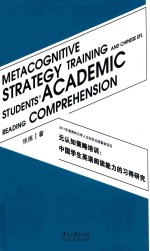

元认知策略培训 中国学生英语阅读能力的习得研究PDF电子书下载
- 电子书积分:12 积分如何计算积分?
- 作 者:张炼著
- 出 版 社:贵阳:贵州大学出版社
- 出版年份:2012
- ISBN:9787811265484
- 页数:348 页
CHAPTER 1 INTRODUCTION 1
1.1 Background of the Study 3
1.2 Statement of the Problem 5
1.3 Objectives of the Study 11
1.4 Research Questions 11
1.5 Significance of the Study 12
1.6 Definitions of the Operational Terms 14
1.7 Outline of the Dissertation 16
1.8 Summary 17
CHAPTER 2 REVIEW OF THE RELATED LITERATURE 19
2.1 Reading Theories:Reading Comprehension Views 21
2.1.1 A Behavioral-based View 21
2.1.2 A Cognitive-based View 22
2.1.3 A Metacognitive-based View 23
2.1.4 Reading Theories and the Present Study 24
2.2 Reading Models 25
2.2.1 Bottom-up Model 25
2.2.2 Top-down Model 27
2.2.3 Interactive Model 29
2.2.4 Reading Models and the Present Study 31
2.3 Theoretical Foundation:Metacognition 33
2.3.1 Definitions and Classifications of Metacognition 34
2.3.2 Metacognitive Knowledge and Reading Comprehension 38
2.3.3 Metacognitive Regulation and Reading Comprehension 40
2.3.4 Metacognitive Strategies and Reading Comprehension 42
2.3.5 Relevance to the Present study 44
2.4 Pedagogical Foundation:Metacognitive Strategy Training 46
2.4.1 Studies on Metacognitive Strategies Training in Reading in Other Countries 47
2.4.2 Studies on Metacognitive Strategies Training in Reading in China 52
2.4.3 Implications for the Present Study 55
2.5 Metacognitive Strategy Training Approaches 57
2.5.1 The Reciprocal Teaching Approach 58
2.5.2 The Transactional Strategy Instruction 59
2.5.3 The Cognitive Academic Language Learning Approach 61
2.5.4 Implications for the Present Study 62
2.6 A Metacognitive Strategy Training Model of Academic Reading Comprehension(MSTARC) 63
2.7 Summary 77
CHAPTER 3 RESEARCH METHODOLOGY 79
3.1 Rationale for the Research Methodology 81
3.2 Participants 82
3.3 Research Instruments 86
3.3.1 Background Information Questionnaire 86
3.3.2 Metacognitive Strategies Questionnaire (MSQ) 87
3.3.3 Reading Comprehension Test 95
3.3.4 Students'Journals 101
3.3.5 Questionnaire 103
3.3.6 Semi-structured Interview 103
3.4 Data Collection Procedures 105
3.4.1 The Overall Experimental Procedures 105
3.4.2 The Metacognitive Reading Strategy Training Model 109
3.5 Data Analysis 115
3.5.1 Descriptive Statistics 115
3.5.2 Independent-sample t-tests 116
3.5.3 Paired-sample t-tests 116
3.5.4 Pearson Correlation Analyses 116
3.5.5 Regression Analyses 116
3.5.6 Qualitative Analysis 117
3.6 The Pilot Study 119
3.6.1 Participants 120
3.6.2 Data Collection Procedures 120
3.6.3 Data Analysis 122
3.6.4 Implications for the Main Study 133
3.7 Summary 136
CHAPTER 4 RESULTS 137
4.1 Answer to Research Question 1 139
4.1.1 Data from MSQ 139
4.1.2 Data from Semi-structured Interview 148
4.2 Answer to Research Question 2 162
4.2.1 Data from the Reading Comprehension Test 162
4.2.2 Data from the Semi-structured Interview 168
4.3 Answer to Research Question 3 174
4.3.1 Correlation between Metacognitive Strategy Use and English Reading Comprehension Achievement 175
4.3.2 Causal Effects of Metacognitive Strategy Use on English Reading Comprehension Achievement 176
4.4 Answer to Research Question 4 180
4.4.1 Data from the Questionnaire 180
4.4.2 Data from the Journal 183
4.4.3 Data from the Semi-structured Interview 188
4.5 Summary 193
CHAPTER 5 DISCUSSION 195
5.1 Effects of the Metacognitive Strategy Training on Reading Comprehension 197
5.1.1 The EFL Students'Metacognitive Strategy Use 197
5.1.2 The Effects of Metacognitive Strategy Training on the Reading Comprehension 209
5.1.3 Correlation between Metacognitive Strategy Use and English Reading Comprehension Achievement 216
5.1.4 Causal Effect of Metacognitive Strategy Use on English Reading Comprehension Achievement 217
5.2 Students'Attitudes towards the Metacognitive Strategy Training for Reading Comprehension 219
5.2.1 Positive Attitudes 219
5.2.2 Neutral and Negative Attitudes 223
5.3 Summary 227
CHAPTER 6 CONCLUSION 229
6.1 Summary of the Study 231
6.2 Pedagogical Implications 236
6.3 Limitations of the Study 239
6.4 Recommendations for Future Research 240
REFERENCES 243
APPENDICES 271
- 《红色旅游的社会效应研究》吴春焕著 2019
- 《汉语词汇知识与习得研究》邢红兵主编 2019
- 《生物质甘油共气化制氢基础研究》赵丽霞 2019
- 《东北民歌文化研究及艺术探析》(中国)杨清波 2019
- 《联吡啶基钌光敏染料的结构与性能的理论研究》李明霞 2019
- 《异质性条件下技术创新最优市场结构研究 以中国高技术产业为例》千慧雄 2019
- 《法语词汇认知联想记忆法》刘莲编著 2020
- 《《国语》和《战国策》词汇比较研究》陈长书著 2017
- 《中国制造业绿色供应链发展研究报告》中国电子信息产业发展研究院 2019
- 《中央财政支持提升专业服务产业发展能力项目水利工程专业课程建设成果 设施农业工程技术》赵英编 2018
- 《历炼精魂 新中国戏曲改造考论》张炼红著;王晓明主编 2013
- 《现代汉语语法探索》胡附,文炼著 1955
- 《汉语修辞文化》张炼强著 2009
- 《生产与作业管理》张炼周主编 2009
- 《荒魂》杨炼著 1986
- 《修辞艺术探新》张炼强著 1992
- 《黄》杨炼著 1989
- 《修辞理据探索》张炼强著 1994
- 《世纪末的艺术反思 西方后现代主义与中国当代美术的文化比较》段炼著 1998
- 《思想与论证》程炼著 2005
- 《大学计算机实验指导及习题解答》曹成志,宋长龙 2019
- 《大学生心理健康与人生发展》王琳责任编辑;(中国)肖宇 2019
- 《大学英语四级考试全真试题 标准模拟 四级》汪开虎主编 2012
- 《大学英语教学的跨文化交际视角研究与创新发展》许丽云,刘枫,尚利明著 2020
- 《复旦大学新闻学院教授学术丛书 新闻实务随想录》刘海贵 2019
- 《大学英语综合教程 1》王佃春,骆敏主编 2015
- 《大学物理简明教程 下 第2版》施卫主编 2020
- 《大学化学实验》李爱勤,侯学会主编 2016
- 《中国十大出版家》王震,贺越明著 1991
- 《近代民营出版机构的英语函授教育 以“商务、中华、开明”函授学校为个案 1915年-1946年版》丁伟 2017
